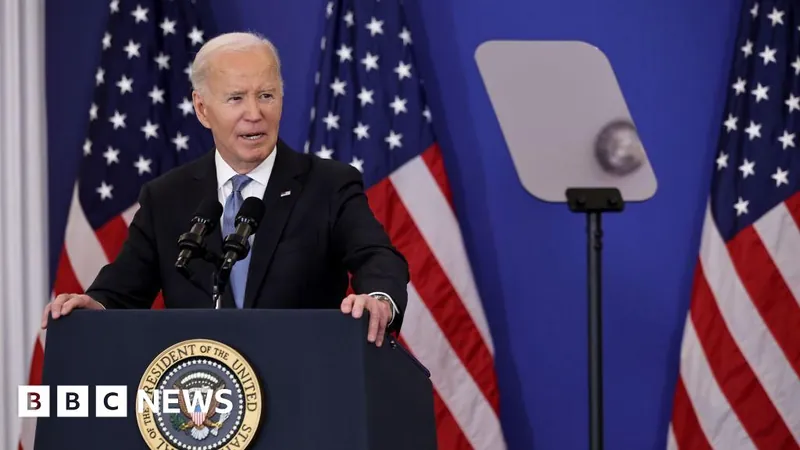
Groundbreaking Shift: Biden to Remove Cuba from Terrorism List in Major Prisoner Exchange Deal
2025-01-14
Author: Liam
Significant Diplomatic Move
In a significant diplomatic move, President Joe Biden is set to remove Cuba from the US designation of state sponsors of terrorism. This decision, announced by the White House on Tuesday, comes as part of a broader prisoner release agreement aimed at fostering dialogue between the two nations.
Cuba's Response
In a swift response to Biden’s announcement, Cuba declared its intention to release 553 prisoners who have been detained for various offenses, with hopes that some of these individuals may include participants from the anti-government protests that rocked the nation four years ago. This prisoner release is seen as a pivotal step towards reconciliation and easing tensions.
Background on Terrorism Designation
The designation of Cuba as a state sponsor of terrorism was reinstated by former President Donald Trump during his last days in office in 2021, labeling Cuba alongside countries like North Korea, Syria, and Iran — nations perceived by the US as offering repeated support for international terrorism. Trump's administration cited Cuba's backing of Venezuelan leader Nicolás Maduro as justification for this classification.
Biden Administration's Reassessment
However, a Biden administration official indicated that a thorough reassessment of Cuba's current stance revealed 'no information' supporting the continued designation as a terrorist state. Cuba's Ministry of Foreign Affairs welcomed this decision, referring to it as a step 'in the right direction,' even while acknowledging its 'limited nature.' They emphasized that lifting the designation would help mitigate the significant damage caused to the Cuban economy due to past sanctions.
Economic Implications
This recent announcement signifies not just a shift in the US policy towards Cuba but could also signify a possible thawing of relations. The ongoing economic struggles in Cuba, exacerbated by the pandemic and strict US sanctions, have made it imperative for the country to seek economic relief. Removing the terror designation could open doors for foreign banks and investors who have been restricted from operating within Cuba due to legal concerns.
Further Policy Changes Expected
In line with this policy shift, the Biden administration is expected to notify Congress of its plans to reverse several Trump-era financial restrictions, thereby allowing for greater economic engagement. Additionally, Biden's administration will suspend claims to confiscated properties in Cuba, which could further facilitate constructive dialogue moving forward.
Uncertain Political Landscape
As political dynamics shift, it remains uncertain how these developments will play out long-term. Indeed, potential political rivals like Trump and his proposed secretary of state nominee, Marco Rubio, have been staunch advocates for continuing sanctions against the island nation. With the political landscape changing, it is yet to be seen whether these new policies will stand the test of time, especially as Trump eyes a potential return to power.
Conclusion
The implications of this decision could be monumental, as they may help to reduce hostilities and encourage a new era of restorative talks between the US and Cuba. It will be interesting to observe how this situation unfolds in the coming months, as both nations grapple with their complex histories. Keep your eyes peeled for what comes next in this evolving story!



 Brasil (PT)
Brasil (PT)
 Canada (EN)
Canada (EN)
 Chile (ES)
Chile (ES)
 Česko (CS)
Česko (CS)
 대한민국 (KO)
대한민국 (KO)
 España (ES)
España (ES)
 France (FR)
France (FR)
 Hong Kong (EN)
Hong Kong (EN)
 Italia (IT)
Italia (IT)
 日本 (JA)
日本 (JA)
 Magyarország (HU)
Magyarország (HU)
 Norge (NO)
Norge (NO)
 Polska (PL)
Polska (PL)
 Schweiz (DE)
Schweiz (DE)
 Singapore (EN)
Singapore (EN)
 Sverige (SV)
Sverige (SV)
 Suomi (FI)
Suomi (FI)
 Türkiye (TR)
Türkiye (TR)
 الإمارات العربية المتحدة (AR)
الإمارات العربية المتحدة (AR)